Different types of IP address from A to Z
We’re going to shed some light on a question that perplexes many especially if you’re a newcomer and not particularly tech-savvy: What type of IP address should we use? There are many different IP address types, from private IP addresses to ethernet broadcast IP addresses. They all serve a similar function: making sure data packets reach their intended destination address. This article is going to discuss types of IP addresses, their similarities, their differences, and everything you need to know about choosing among them for your needs.
First of all, let’s explore what is an IP
Well, simply put IP stands for internet protocol.
Protocols are a set of rules that servers use to communicate with each other across the internet. Your Internet Protocol or IP is the address assigned to the domain on the internet.
IP addresses are required for communication between devices and servers, just as a physical mailing address is required for mail delivery. For instance, if you google the question "What is a VPN?," your IP address will trigger a request to be sent to Google's servers. After then, Google will look for an answer to your question and send it back to you, locating you based on your IP address.

So, how many types of IP addresses are there?
What is a private IP address?
A private IP address, also known as the local IP address, is the IP address your network router allocates to your device. Each device on the same internal network is given a unique private IP address that allows them to communicate with one another. This address is only visible within your network, so it is unavailable on the internet.
Private IP addresses enable devices on the same network to interact without needing to connect to the internet. Private IPs assist to strengthen security within a specified network, such as your home or workplace, by making it more difficult for an external host or user to establish a connection. This is why you can print papers from your home printer using a wireless connection, but your neighbor can't send their files to your printer accidentally.
What is a public IP address?
A public IP address is the public-facing IP address provided to your network by your internet service provider (ISP). The internet is accessed through your router's public IP address. When you connect to the internet using your router's public IP, your personal device has a private IP address that is concealed. You can not go online without having your public IP address, which identifies your device on the internet.
Let's do a comparison to get a clearer picture of public IP. With traditional mail, when you send a letter, you have to know the address to send it to—such as “1234 Main Street,”—so that the postman knows which street and which house to take it to.

The Internet works similarly, except it directs your personal activity (emails, answers to Google inquiries, etc.), and forwards the electronic messages to your computer’s address. You couldn’t do much without a public IP address. It’s your passport to the Internet.
Private vs. public IP address
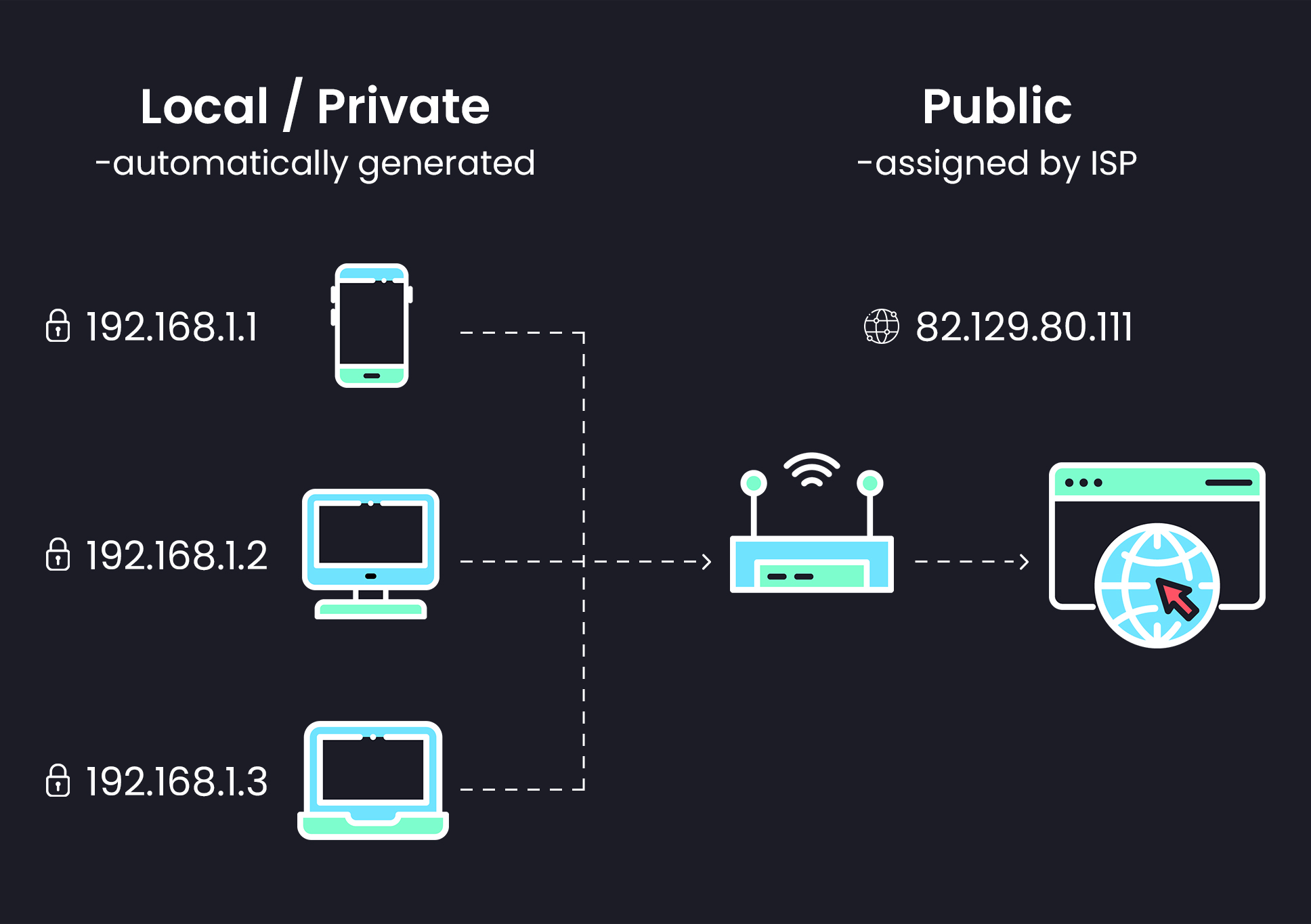
Each internet-connected device has both private and public IP addresses. Why are two required? Because the current number of IP addresses is insufficient to meet the rising number of devices in use. Back in the 1980s, the IPv4 protocol was created, and with it came 32-bit numerical IP addresses. This corresponded to almost 4.3 billion unique IP addresses. However, it became quickly apparent that we needed more.
Using private IP addresses and Network Address Translation (NAT) helped cope with the problem. Your router's network address translation system directs the traffic from the web to all the devices connected to the same internet network. These devices each get a one-of-a-kind private IP address, which is likewise assigned by the router. Because they cannot be routed through the internet, many devices located in different parts of the globe may share the same private IP addresses without causing any conflicts.
Two types of public IP address
There are two kinds of public IP addresses: static and dynamic.
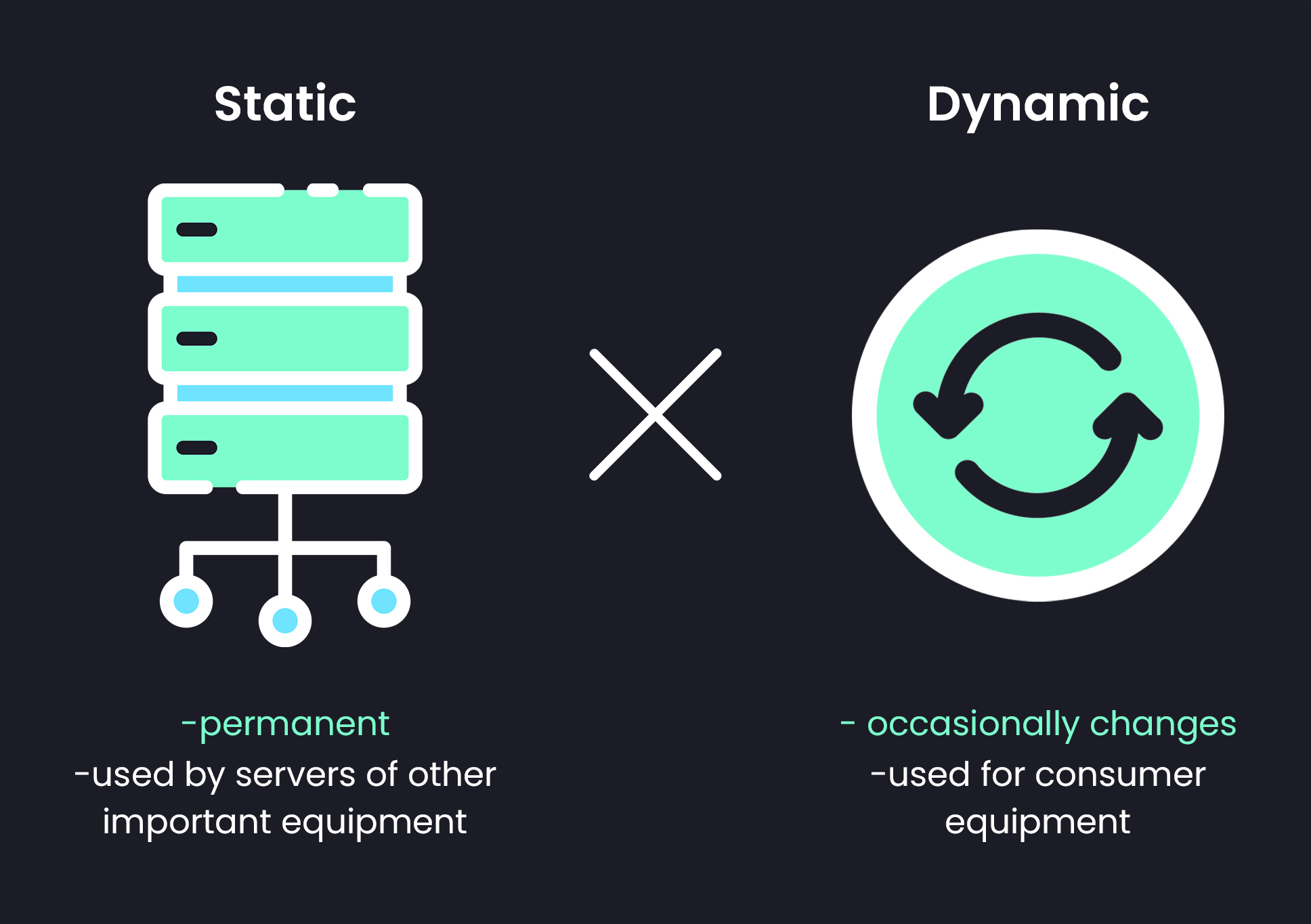
What is a static IP address?
Simply said, a static IP address is an IP address that does not change. Once your device is assigned a static IP address, that number typically stays the same until the device is decommissioned or your network architecture changes. Static IP addresses are assigned by Internet Service Providers (ISPs).
A static IP address may be IPv4 or IPv6; in this case, the important quality is static. Some day, every bit of networked gear we have might have a unique static IPv6 address. We're not there yet. For now, we usually use static IPv4 addresses for permanent addresses.
Servers that host websites, send emails, or offer FTP services often get static IP addresses. However, they can also be given to public organizations that need stable connections and consistent web addresses. Static IP Addresses are rarely used for individual households as they have some downsides.
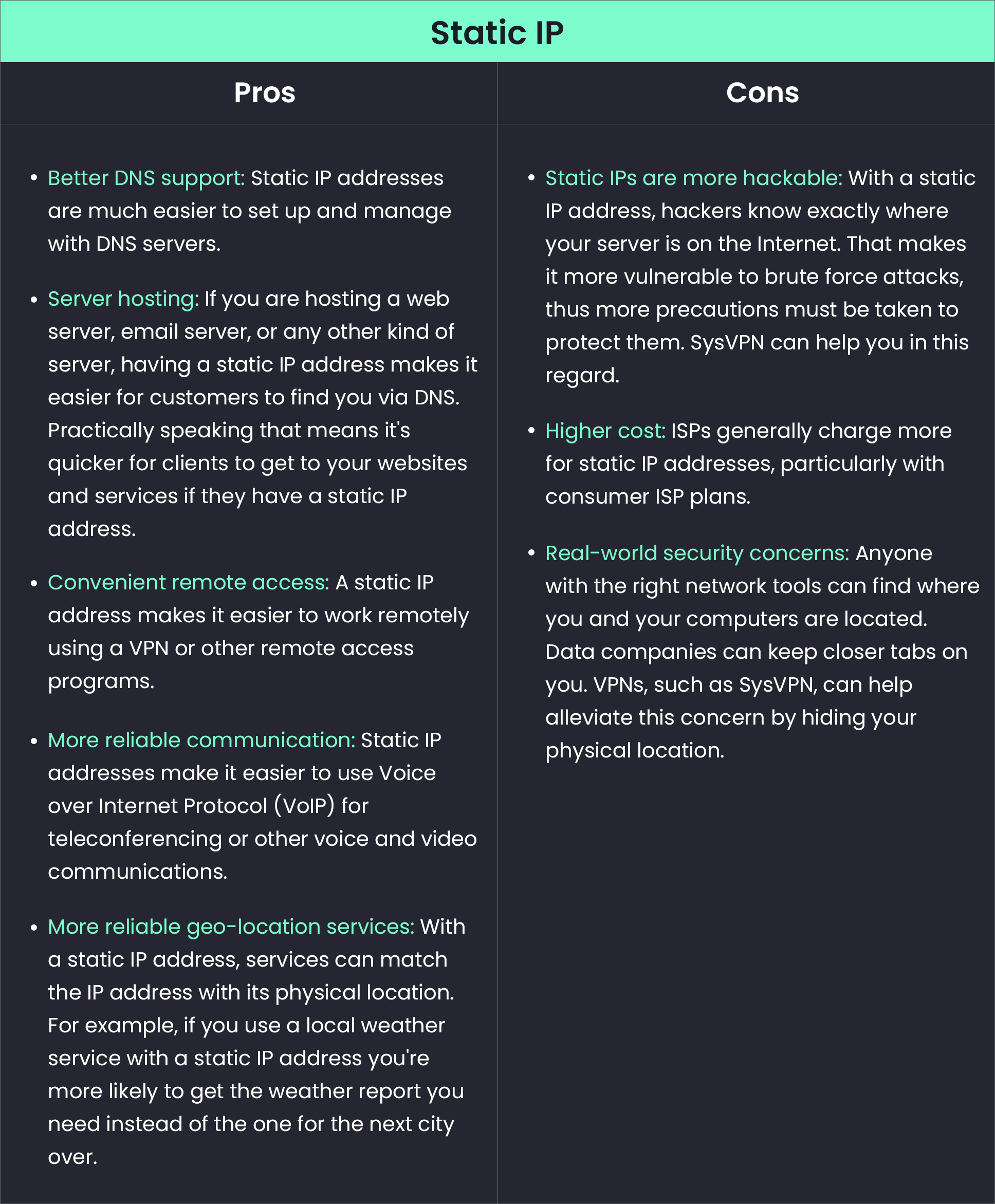
What is a dynamic IP address?
As the name suggests, dynamic IP addresses are subject to change, sometimes at a moment's notice. Dynamic addresses are assigned, as needed, by Dynamic Host Configuration Protocol (DHCP) servers.
We use dynamic addresses because IPv4 doesn't provide enough static IP addresses to go around. So, for example, a hotel probably has a static IP address, but each individual device within its rooms would have a dynamic IP address.
On the internet, your home or office may be assigned a dynamic IP address by your ISP's DHCP server. Within your home or business network, the dynamic IP address for your devices -- whether they are personal PCs, cellphones, streaming media devices, tablets, or anything else -- are probably assigned by your network router. Dynamic IP is the standard used by and for consumer equipment. The changes Dynamic IPs make rarely have any impact on your connection, and a dynamic IP address is the go-to in most households.
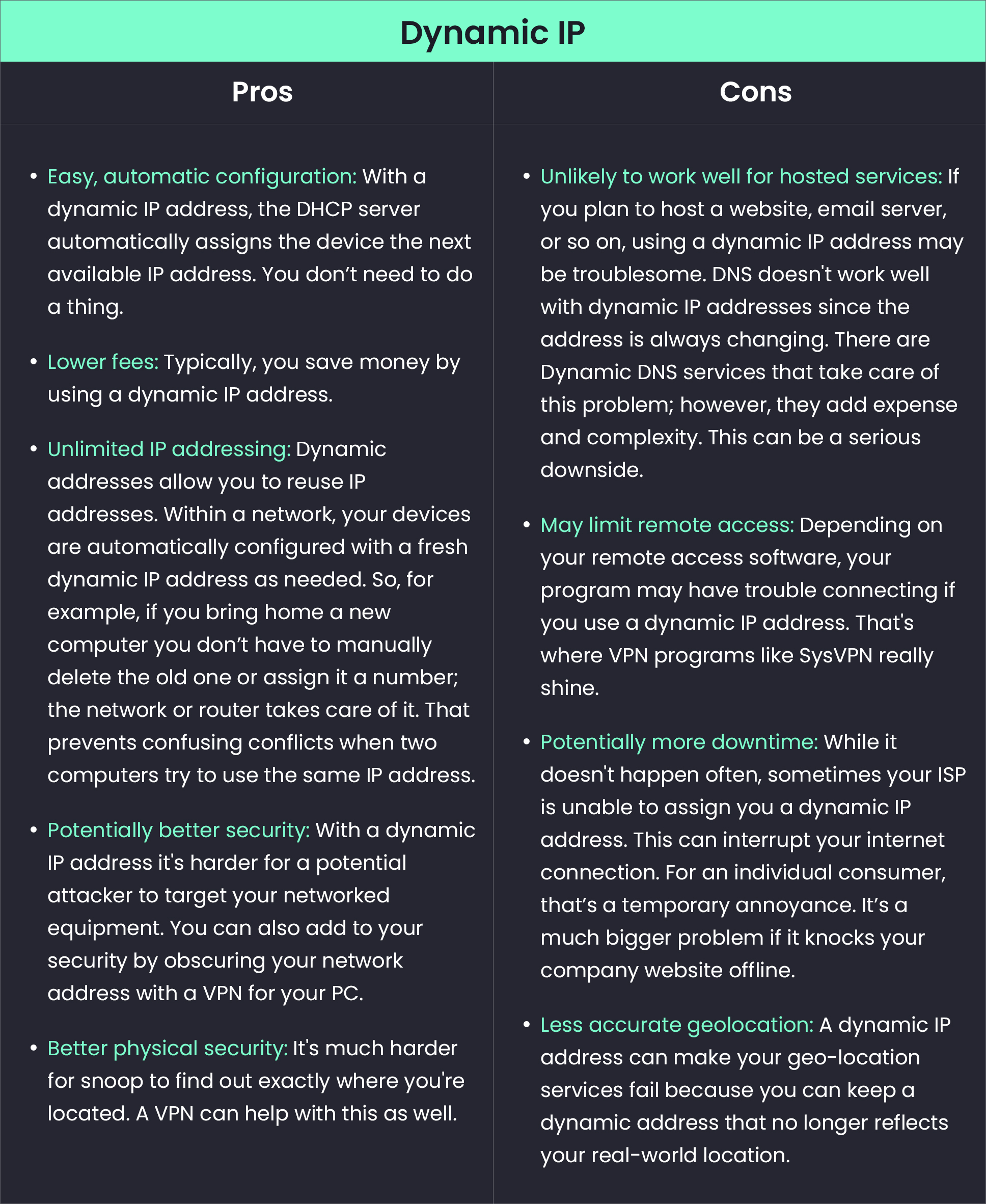
Dedicated IPs & Shared IPs
There are two types of IPs: dedicated IPs and shared IPs.
• Dedicated IP addresses are only used by you. It is an IP that is reserved for the single-use by 1 domain owner and 1 website. Think of this as your personal cell phone, as opposed to a home phone line that can be answered by anyone in your home. When you use a dedicated IP to send emails, your messages are sent from a unique and exclusive IP. As such, you have complete control over your email sender’s reputation and thus email deliverability.
• Shared IP addresses are also used by other senders. A shared IP address hosts multiple domain owners and multiple websites. This can be one, two, or even ten clients all sharing the same resource. You won’t have full control over your sender’s reputation and email deliverability. Instead, an email client pools all the sender’s reputation associated with your shared IP to determine deliverability.
So, what’s the Difference between them?
Now that you have a good idea of what a shared and a dedicated IP are, it should be clear the difference between the two and what it means for you as a VPN user.

Anonymity is the primary advantage of a VPN, which is achieved by connecting many devices to the same shared IP address. Your true identity and location will remain concealed while you surf the web freely and safely. While this is excellent news for anyone seeking enhanced online safety and protection, it does not guarantee perfect anonymity. There is no way to hide the fact that you are using a VPN from your ISP or any other third party.
Having a dedicated IP address, on the other hand, ensures that your IP address is only yours and no one else will ever use that IP. To top it all off, nobody will ever know you're using a VPN, giving you perfect privacy online.
Since your IP address is unique and not shared with other users, it is far more difficult for hackers to identify you and intercept your sensitive data. This makes it ideal for those who want to safeguard their online identity or who need more protection while using public Wi-Fi networks. It is hard for anybody else to see what you are doing when you choose this option, making it the perfect choice for folks who use torrents and download content online.
Using a VPN that has a dedicated IP address comes with a number of drawbacks, the most significant of which is the fact that the cost of doing so is much higher than that of using shared IP. It is worth it if you are searching for the utmost degree of anonymity and security when going online; however, it may not be practicable for the normal user.
Shared IP addresses are the way to go if you're searching for an alternative that's a little easier on the wallet. The vast majority of users benefit greatly from the enhanced security and anonymity offered by these, although the degree of protection they give is not quite on par with that offered by dedicated IP addresses.
What IP do I get when I use a VPN?
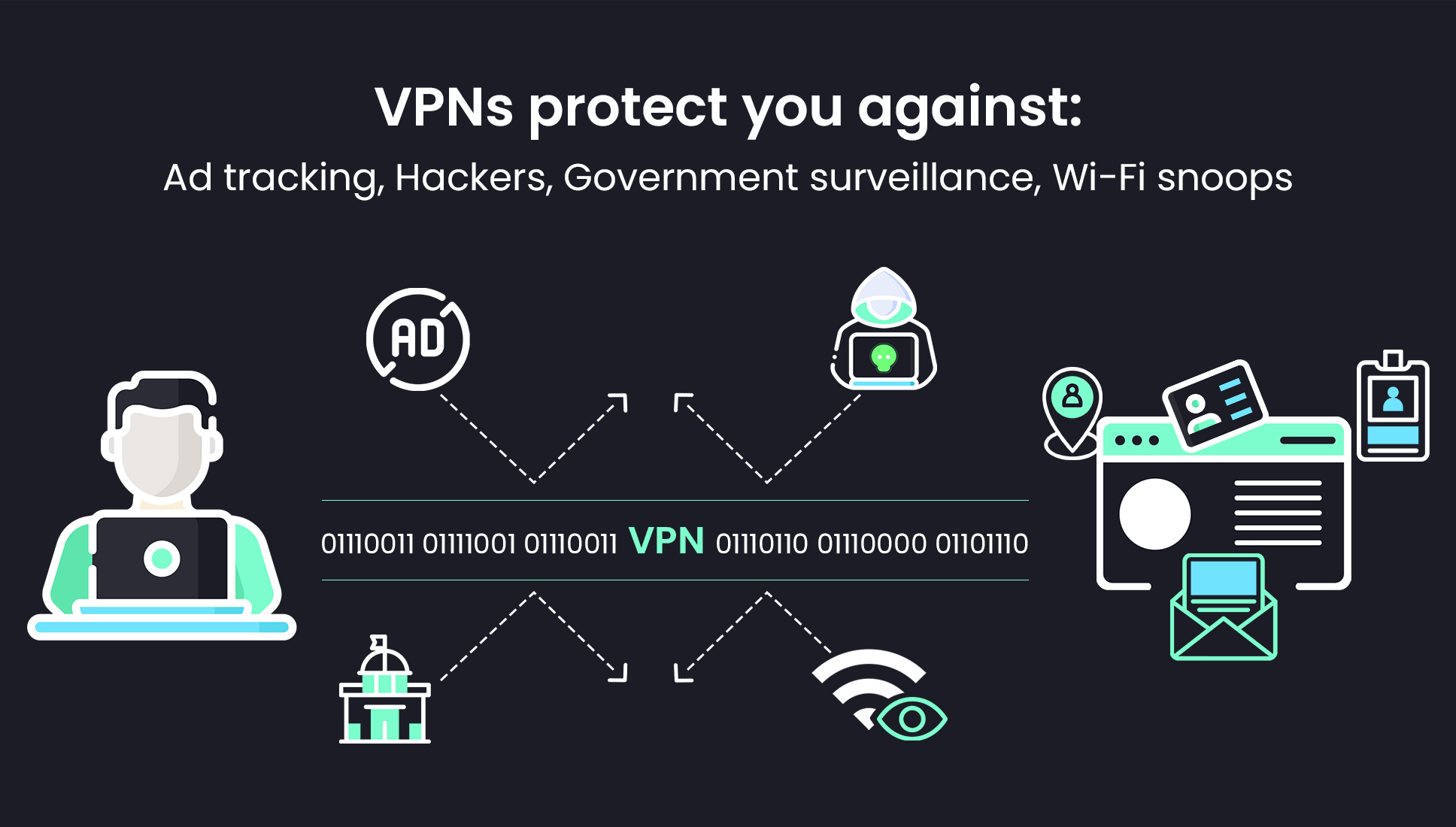
An IP address may reveal a lot of information about its owner, including their physical location, who owns the IP, and even the digital footprint that the IP has left behind. However, if you send all of your traffic over a virtual private network (VPN), then your IP address will be changed. But what type of IP address are VPN users assigned? You may have either a shared or a dedicated IP address.
When you sign up for a VPN service, you may expect to get a shared IP address. It's the greatest choice for your privacy. Since it is used by many people, it makes it harder for websites to keep tabs on you. Sharing an IP address is not only beneficial for P2P file sharing, but it also enables users who often travel to access content that may be censored in your destination.
In contrast, a shared IP might have a "bad neighbor effect," meaning that if someone using the same IP gets blacklisted on a certain website, you will not be able to access it either. This happens quite seldom, though. The most annoying thing that may happen to you is that websites will bombard you with more captcha questions than normal in an effort to verify that you are not a bot.



